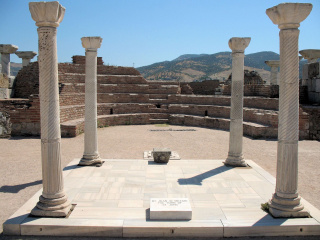3John is the shortest of the General Epistles, and of the entire Bible, with only 294 words. John's second epistle, 2John, with its 13 verses, is the smallest in terms of verses.
Date Written, Location
The book of 3John was written by John the Apostle between 63 and 64 A.D. He likely wrote the book from Ephesus.
[Why Is the Bible Hard to Read?]
The Author
John, a fisherman, was called by Jesus to follow him in late October 26 A.D. During the Lord's ministry John was one of three men, the other two being Peter and James, who were close to Jesus.
John lived roughly seventy years after the resurrection of Christ in 30 A.D. He died, around 100 A.D., with the longest ministry of any of the original twelve apostles. According to tradition His grave is believed to be in Ephesus.
3John Chapter Outline
Chpt. 1: John opens 3John with a brief greeting to a fellow Christian named Gaius whose name means "lord" (Thayer's Greek Definitions #G1050). It is unknown where Gaius lived.

John wishes prosperity and health come to Gaius to match his spiritual maturity (3John 1:2). The apostle then reveals those who know him testify to his steadfastness in God's truth and willingness to serve. One area in which Gaius excels is opening up his home to aid traveling evangelists and missionaries.
According to the apostle, anyone who helps those spreading the gospel becomes fellow laborers in the Great Commission God gave his church.
[What Is the Great Commission?]
Beloved, you are faithfully practicing whatever you have been doing for the brethren and for strangers . . . You will do well to send them on their way in a manner worthy of God . . .
For this cause, we are personally obligated to receive those who do such service, in order that we may be fellow workers in the truth (3John 1:5 - 6, 8, HBFV).
In 3John 1:9 the apostle reveals the purpose of his letter. It was to inform Gaius that Diotrephes, the man who headed up the fellowship he attended, had rejected a letter sent from him. It is strongly implied that Diotrephes' rejection of John's admonitions, and likely suppression of the letter from the rest of the church, was previously unknown to Gaius.
[Run a Church Without a Minister!]
Diotrephes' arrogance, pursuit of his own personal ambitions, and willingness to rule the church like a dictator (top-down church government) was called into question by John.

. . . I will call him (Diotrephes) to account for the actions that he is practicing with evil words - maliciously berating us;
and he is not satisfied with these things, for he himself neither receives the brethren, nor does he permit those who wish to receive the brethren, but he forbids them and casts them out of the church (3John 1:10, HBFV).
Diotrephes' sins are many. His belief in his own spiritual superiority led him to reject the Apostle John. He indulged in an evil smear campaign that gossiped lies about John and other Christians in order to increase his power in the church (3John 1:10).
[Qualities of a True Christian Leader]
Diotrephes additionally refused to welcome visiting Christians and those traveling to advance the gospel message. He lastly had the audacity to forbid any of the brethren from also extending aid to fellow believers and threw out of the fellowship anyone who disobeyed this rule!
John rightfully labels Diotrephes' behavior evil (3John 1:11). He then encourages Gaius to follow the example of Demtrius who righteous character was known to many.
The letter closes with John promising to visit Gaius (3John 1:14), which would almost certainly be the time when the apostle would personally confront Diotrephes (verse 10).